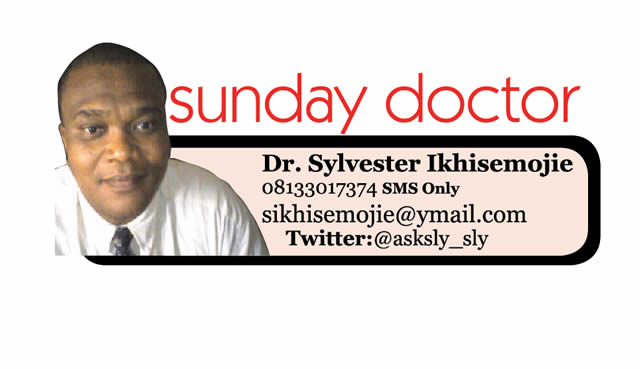
Last week, we discussed the issue of low back pain but focused mainly on the manifestations of this common condition, the range of measures often taken to ameliorate such pain and the reasons why certain measures work while others do not.
However, equally importantly, it is necessary to understand how this common condition comes about and why. Low back pain is often due to overuse of the back, which many sufferers usually refer to as waist pain and it may also be a sign of an underlying medical condition.
Accordingly, the United States National Institute of Neurological Disorders and Stroke has gone so far as to posit that about 80 per cent of all adults will experience low back pain at some point in their lives. Such pain can appear quite suddenly as may occur when a person hurts the back following an injury or a fall but it may also be a gradual, almost indolent kind of painful discomfort that may wax strong and wane over a period of time.
Such pain may therefore range from a dull persistent ache to a sharp, intense pain that can be incapacitating to such a degree that a full-grown adult sufferer may be unable to stand erect or walk. In some other people, such pain may be chronic and long-lasting to the point of genuine misery and inability to do any productive work especially if there is associated muscle wasting. We shall, therefore, be looking at some of the common causes of low back pain and the measures required to deal with such pain.
Strains to the back and sprains are common causes of low back pain. A sprain can result when a person tears a ligament or overstretches it. When the same thing is done to a muscle or tendon, a similar degree of pain can result. Therefore, diagnosis can often read like an acute low back strain and the absence of any nerve injury in this situation comfortably leads to the development of a treatment strategy involving the use of medications and physiotherapy to deliver the required relief.
These pains can result, therefore, from lifting heavy objects that turn out to be too heavy or when such objects are lifted improperly. Importantly, people ought to know that there are useful positions that the body should be positioned in so that a heavy object can be lifted optimally and with minimal strain on the back.
It is why weight lifters assume the positions they take when they want to lift heavy objects. Failure to adhere to these principles of strength and balance often leads to difficulties over a period of time. And so, it is not uncommon to find artisans, mechanics and masons who deploy improper strategies in lifting the various types of cargo that they carry succumb to this occasionally debilitating condition. Overuse of the back muscles, occasionally awkward twisting movements of the back, and injuries related to certain types of sports are all very likely to cause such problems.
The symptoms of such low back pain will usually include such features as muscle spasms, swelling and tenderness when it is touched. People have been seen to grit their teeth and break out in tears as a result of the intensity of pain. On the other hand, the delivery of a forceful impact to that region of the back can cause direct injury to the spine itself such that fractures of the vertebrae and rupture of the discs have been known to happen.
These scenarios are seen when people fall from heights or are injured as a result of high-contact sports or due to road traffic injuries seen often in our country due to bad roads and equally unsafe vehicles. In situations like those, back pain occurs almost soon after the impact. There may also be a tingling sensation and numbness that could radiate down the legs. It is usually at this point that most people agree that they have a serious problem and proceed to visit the hospital.
Other serious consequences of these injuries or similar impacts involve the development of the cauda equina syndrome, a rare condition often seen when pressure applied from outside of the spine causes the compression of the cauda equina which itself is a bundle of nerves that is found at the lower part of the spinal cord. This condition often results from a herniation of the disc, infections in that area of the spinal cord and tumours.
Fractures as we discussed above and narrowing of the spine being a complication of spinal surgery can also cause such a condition. The features of this more serious situation are typically severe low back pain associated with much difficulty in walking. There may also be some numbness in the legs which may be followed by weakness and loss of sensation in one or both legs.
Worse, there could be bowel and bladder problems with the person affected unable to control his stool or urine. Frequently, they are not aware that they need to empty their bowel of stool until such stool has come out of the body. The same is true for urine and this twin situation is often very distressing for the patient concerned.
These occurrences are also associated with spinal stenosis which can result from gradually worsening space limitations affecting the lower back. The cauda equina syndrome is a medical emergency and it can lead to serious complications if there is a delay in obtaining the relevant professional treatment. In most instances, an emergency operation to relieve the pressure on the nerves is recommended. In our country where there is a serious shortage of both spine surgeons and neurosurgeons, doctors will often find themselves compelled to perform some other manoeuvres to relieve such pressure.
In the end, all of these measures are tailored towards reducing the person’s risk of developing permanent paralysis and the onset of incontinence. A similar range of features might develop as a result of an infection involving the spine. Such infections result when bacteria, viruses and even fungi travel from areas of the body where they already have established infection and travel to the spine.
While these infections can develop as a result of complications from injuries or spinal surgeries, it is more likely to find them associated with diabetes, HIV/AIDS and cancer. These infections may be acute and develop suddenly or chronically. Acute infections include an epidural abscess which is an infection that develops from the protective membranes around the spinal cord or from osteomyelitis, which is an infection of the small bones of the vertebrae.
A common chronic infection in that part of the body is tuberculosis which is often diagnosed late in many cases because when the patients present to the hospital. Often, the diagnosis is made after they have gone round the country from the auxiliary nurse who lives in the neighbourhood to the local chemist before they go on to the private clinic in the area and finally on to the general hospital where some light may be shed on the nature of the illness and from where they may end up at the hands of an orthopaedic surgeon.
Such an odyssey could take from several weeks to months depending on how severe the presenting symptoms are seen to be. Because this scenario is related to a provoking micro-organism, there is associated fever and chills with typically severe muscle pains and cramps. There may be swelling and much tenderness over that region of the back and loss of sensation in the legs could follow depending on how rapidly the condition develops.
A similar situation may be associated with degenerative diseases of the bones of the spine. As we saw last week, each of these unique situations is treatable depending on the cause. Often, treatment is a combination of the relevant medications including pain relief, antibiotics where an infection is diagnosed, associated physiotherapy and adequate control of any underlying disease condition such as diabetes and HIV/ AIDS.
In some cases, as a last resort, an operation may be recommended. This is a brief synopsis of the debilitating condition that low back pain can constitute. The duration of treatment can range from a few days to weeks and even months. In some of the worst conditions, treatment could become a life-long project but most of the sufferers are usually some 50 years of age and over.





